Professor Francis Leneghan
I am interested in all aspects of Old English poetry and prose, in particular Beowulf, translations of the Bible and writing associated with King Alfred.
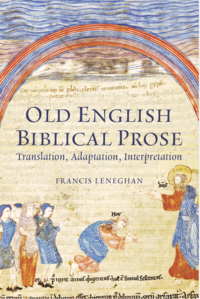
Old English Prose
I am currently working on a project on Old English prose, funded by a Leverhulme Research Fellowship (2023–2024) and an AHRC Research, Development and Engagement Award (2024–2026). The project website, ROEP (Resources for Old English Prose), provides short introductions of Old English prose texts, audio recordings and other resources. Two monographs will result from the project, both contracted to Boydell: the first, entitled Old English Biblical Prose: Translation, Adaptation and Interpretation, was published as Open Access in January 2026; the second is a broader study of the phenomenon of Old English prose from the ninth to eleventh centuries. You can read more about this project here.
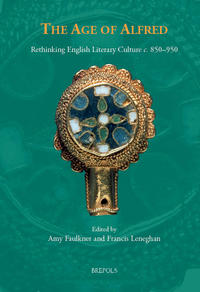
The Age of Alfred
Together with Dr Amy Faulkner (UCL), I organised The Age of Alfred, an international research project involving over 40 scholars that began in 2020. This project re-evaluates English literary culture c. 850-950. As well as examining the traditional corpus of texts associated with the king, namely the Old English Pastoral Care, Boethius, Soliloquies and Prose Psalms, we are equally interested in works often placed outside of this royal canon, such as the Old English Bede, Orosius and Dialogues, the Domboc and the Anglo-Saxon Chronicle. The project yielded a collection of essays entitled The Age of Alfred: Rethinking English Literary Culture c. 850–950, edited by Amy Faulkner and myself and published by Brepols in 2024. I also edited a special edition of SELIM, the Spanish Journal for Medieval English Language and Literature, on 'New Readings in Alfredian Literature' (2024).
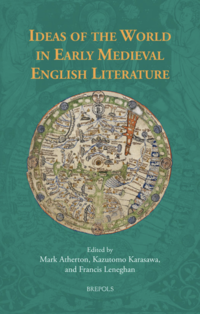
Ideas of the World in Early Medieval English Literature
In 2020-2021, I co-organised an international research project with Prof. Kazutomo Karasawa (Rikkyo) and Dr Mark Atherton (Oxford) charting the development of competing geographical, national and imperial identities and communities in early medieval England. Through a series of symposia, conferences and other events, this project brought together scholars to explore early English ideas about space and place, nation and identity, and geography and history. An edited collection stemming from these meetings was published by Brepols in 2022: Ideas of the World in Early Medieval English Literature (winner of the International Society for the Study of Early Medieval England [ISSEME] Best Book Prize 2023). My own contribution focused on the influence of imperial thinking on the compilation of MS Cotton Tiberius B.i, an eleventh-century anthology of Old English prose and verse on historical and religious themes.
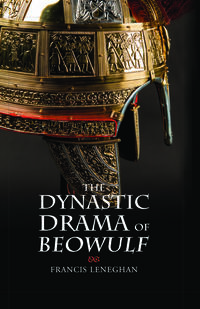
Beowulf
I have published extensively on various aspects of the Old English poem Beowulf. The Dynastic Drama of Beowulf, Anglo-Saxon Studies 39 (Cambridge: D. S. Brewer, 2020), unravels the web of Scandinavian royal legends known to the original audience of Beowulf. The book offers a new interpretation of the work’s structure based on the principle of the dynastic life-cycle and provides explanations for features of the poem that have never been satisfactorily explained, most famously its many digressions and episodes. Highlighting the work’s originality, it proposes that the poet invented a new monster-slaying hero, inserting him into royal legend in order to dramatize moments of dynastic crisis. It also brings into focus the poet’s debt to biblical paradigms of kingship and shows how the Anglo-Saxons came to read Beowulf as their own Book of Kings.
I have recently published articles on links between Beowulf and the Staffordshire Hoard, an analysis of hunting imagery, and studies of hagiographical parallels for the fight with Grendel and the theme of righteous indignation. In October 2024, I organised a Beowulf Study Day in honour of Heather O'Donoghue's book on the poem.
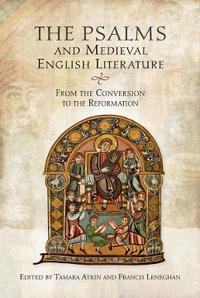
Oxford Psalms Network
Another area of my research is concerned with the reception of the Bible, in particular the Book of Psalms, in medieval England. Along with Professor Susan Gillingham (Theology) and Dr Helen Appleton (English), I am a founder and co-organiser of The Oxford Psalms Network, an interdisciplinary research group hosted by The Oxford Research Centre for the Humanities (TORCH) and devoted to the study of all aspects of the Psalms. In 2020 this project was chosen as a REF-Impact Case Study for the Theology Faculty.
Related to this research, I have co-edited two volumes of essays on medieval English psalms: The Psalms and Medieval English Literature: From the Conversion to the Reformation (Cambridge: D. S. Brewer, 2017) (with Tamara Atkin); and The Psalms in Anglo-Saxon and Anglo-Norman England, special edition of English Studies, 98.1 (2017) (with Helen Appleton). In 2013, I co-organised the Psalm Culture conference at Queen Mary University, London with Prof. Tamara Atkin and Prof. Ruth Ahnert.
Other Research Activities and Roles
In April 2025, I co-organised a conference on the Exeter Book with my colleague Prof. Rachel A. Burns, and a graduate and ECR training day on Old English prose (2025). I will organise a major international conference on New Directions in Old English Prose in March 2026.
In 2024, I was awarded a Visiting Research Fellowship at Trinity College Dublin's Long Room Hub Arts and Humanities Research Institute. I was also a Visiting Researcher at the University of Oslo in the same year.
I am founder and Series Editor/Secretary of a book series with Brepols, Studies in Old English Literature (SOEL), and Series Editor of Exeter Medieval Texts and Studies (EMTS). I serve on the Advisory Editorial Board for EMEN (Early Medieval England and its Neighbours) and SELIM (the Spanish Journal for Medieval English Language and Literature), and I am Associate Editor for The Explicator. From 2019–2024, I was Associate Editor of The Year's Work in English Studies. I am currently serving as Chair of TOEBI (Teachers of Old English in Britain and Ireland).
I lecture on Old English poetry and prose in the English Faculty and I teach Medieval English at St Peter's college. I also teach Old English to Course II students from across the university.
Undergraduate teaching and supervision:
Prelims Paper 2 (Early Medieval Literature, c. 650-1350)
FHS Paper 2 (English Literature 1350-1550)
Course II FHS Paper 1 (Literature in English 600-1100)
FHS Paper 7: dissertations on early medieval English.
Graduate teaching and supervision:
'Old English for Beginners/Improvers'
'The Age of Alfred' (C-course)
'Beowulf and its Traditions' (C-course)
I supervise Masters and Doctoral dissertations on a wide range of topics connected with Old English literature. I have supervised doctorates on areas including medicine, Mercian vernacular literature, the Old English Metrical Charms, Anglo-Latin and Old English saints' lives, Alfredian prose, Ælfric, biblical poetry and Beowulf adaptations. Currently I am supervising doctorates on Wulfstan, Alfred's lawcode, Old English and continental Saxon poetry, nautical imagery in Old English narrative verse, the Soul and Body poem and drinking vessels in Old and Early Middle English poetry. I welcome applications from students interested in any area of Old English literature.
Publications
Monographs
Old English Biblical Prose: Translation, Adaptation, Interpretation, Anglo-Saxon Studies 54 (Cambridge: D. S. Brewer, 2026)
The Dynastic Drama of 'Beowulf', Anglo-Saxon Studies 39 (Cambridge: D. S. Brewer, 2020).
Edited Collections
The Age of Alfred: Rethinking English Literary Culture c. 850–950, ed. Amy Faulkner and Francis Leneghan, Studies in Old English Literature 3 (Turnhout: Brepols, 2024).
Ideas of the World in Early Medieval English Literature, ed. Mark Atherton, Kazutomo Karasawa and Francis Leneghan, Studies in Old English Literature 1 (Turnhout: Brepols, 2022).
The Psalms and Medieval English Literature: From the Conversion to the Reformation, ed. Tamara Atkin and Francis Leneghan (Cambridge: D. S. Brewer, 2017).
Special Editions of Journals
New Readings in Alfredian Literature, ed. Francis Leneghan, special edition of SELIM 29 (2024).
The Psalms in Anglo-Saxon and Anglo-Norman England, special edition of English Studies 98.1 (2017), ed. Helen Appleton and Francis Leneghan.
Articles and Book Chapters
'Introduction', SELIM 29, special edition on New Readings in Alfredian Literature, ed. Francis Leneghan (2024), 1-4.
'Beowulf, the Wrath of God and the Fall of the Angels', English Studies 105.3, special edition on Morality, Exemplarity, and Emotion in Old English Literature, ed. Niamh Kehoe (2024), 383–403.
'Introduction: Rethinking English Literary Culture c. 850–950', with Amy Faulkner, in The Age of Alfred: Rethinking English Literary Culture c. 850–950, ed. Amy Faulkner and Francis Leneghan, Studies in Old English Literature 3 (Turnhout: Brepols, 2024), pp. 17–48.
'The Haunting of Heorot: Gregory's Dialogi and Beowulf's Fight with Grendel', Medium Ævum 92.1 (2023), 1–29.
'Introduction: Foreign Contacts, Landscapes and Empire Building', with Mark Atherton and Kazutomo Karasawa, in Ideas of the World in Early Medieval English Literature, ed. Mark Atherton, Kazutomo Karasawa and Francis Leneghan, Studies in Old English Literature 1 (Turnhout: Brepols, 2022), pp. 11–39.
'End of Empire? Reading The Death of Edward in MS Cotton Tiberius B I', in Ideas of the World in Early Medieval English Literature, ed. Mark Atherton, Kazutomo Karasawa and Francis Leneghan, Studies in Old English Literature 1 (Turnhout: Brepols, 2022), pp. 403–34.
'Beowulf and the Hunt', Humanities 11 (2), 36 (2022), 1–22; reprinted in Old English Poetry and its Legacy, ed. Robert E. Bjork (Basel: MDPI, 2023), pp. 127–48. [Winner of the Humanities 2022 Best Paper Award].
‘Dishonouring the Dead: Beowulf and the Staffordshire Hoard’, Quaestio Insularis 21 (2020), 1–32.
'The Departure of the Hero in a Ship: the Intertextuality of Beowulf, Cynewulf and Andreas', SELIM: Journal of the Spanish Society for Medieval English Language and Literature 24 (2019), 105–32.
‘Introduction: a Case Study of Psalm 50.1-3 in Old and Middle English’, in The Psalms and Medieval English Literature: From the Conversion to the Reformation, ed. Tamara Atkin and Francis Leneghan (Cambridge: D. S. Brewer, 2017), pp. 1–33.
'Making the Psalter Sing: the Old English Metrical Psalms, Rhythm and Ruminatio’, in The Psalms and Medieval English Literature: From the Conversion to the Reformation, ed. Tamara Atkin and Francis Leneghan (Cambridge: D. S. Brewer, 2017), pp. 173–97.
‘Introduction: The Psalms in Anglo-Saxon and Anglo-Norman England’, with Helen Appleton, in The Psalms in Anglo-Saxon and Anglo-Norman England, ed. Helen Appleton and Francis Leneghan, special edition of English Studies 98.1 (2017), 1–4.
‘Preparing the Mind for Prayer: The Wanderer, Hesychasm and Theosis’, Neophilologus 100.1 (2016), 121–42.
‘Translatio Imperii: the Old English Orosius and the Rise of Wessex’, Anglia 133.4 (2015), 656–705.
‘Teaching the Teachers: the Vercelli Book and the Mixed Life’, English Studies 94.6 (2013), 627–58.
‘Reshaping Tradition: the Originality of the Scyld Scefing Episode in Beowulf’, in Transmission and Generation in Medieval and Renaissance Literature: Essays in Honour of John Scattergood, ed. Karen Hodder and Brendan O’Connell (Dublin: Four Courts Press, 2012), pp. 21-36.
‘Royal Wisdom and the Alfredian Context of Cynewulf and Cyneheard’, Anglo-Saxon England 39 (2010), 71-104.
‘The Poetic Purpose of the Offa-Digression in Beowulf’, The Review of English Studies 60.246 (2009), 538–60.
‘Making Sense of Ker’s Dates: the Origins of Beowulf and the Palaeographers’, Proceedings of the Manchester Centre for Anglo-Saxon Studies Postgraduate Conference 1, March 2005.
Podcasting, Knowledge Exchange and Outreach
ROEP: Resources for Old English Prose
Lectures for Virtual Primary Hub, PTI (2025–)
Article on 'Who was King Alfred? And was he really "Great"?', Primary History 99 (2025), 26–32
Audio recordings of Old English Metrical Psalms (CLASP - Consolidated Library of Anglo-Saxon Poetry)
King Alfred the Great (for Oxford University's Great Writers Inspire Project)
Comets, Omens and Fear: Understanding Plague in the Middle Ages, The Conversation June 2020
Click these links to listen to my podcasts:
The One Who Flies: A History of Pandemics (Queen's University, Belfast)
'Beowulf' (for Oxford University's Great Writers Inspire Project)
'Why should we study Old English?' (for the 'Challenging the Canon' Project)
Links:
ROEP (Resources for Old English Prose)
Studies in Old English Literature
Exeter Medieval Texts and Studies
Dorothy Whitelock Lecture Series




